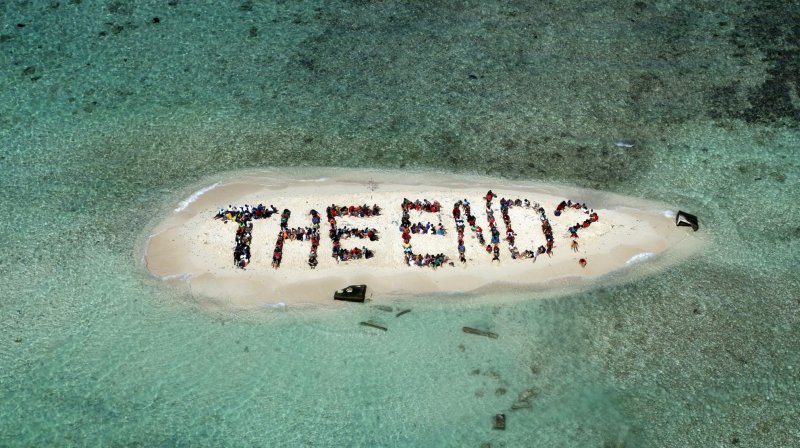Activists gather in Belize to form a human banner asking if the end is near for endangered coral reefs around the world. UPI File Photo/Lou Dematteis/Spectral Q |
License Photo
CAIRNS, Australia, July 11 (UPI) -- Most of the world's coral reefs face devastation without global action to reduce carbon dioxide emissions, scientists warn.
A consensus statement signed by more than 2,500 marine scientists and presented this week at the 12th International Coral Reef Symposium in Cairns, Australia, says by the end of this century CO2 emissions at the current rate will warm sea surface temperatures by at least 2-3 degrees Celsius, raise sea levels by as much as 1.7 meters, reduce ocean pH from 8.1 to less than 7.9 and increase the frequency and intensity of storms.
"This combined change in temperature and ocean chemistry has not occurred since the last reef crisis 55 million years ago," the scientists' statement said.
They estimate reefs provide $170 billion to $375 billion annually in goods and services.
But about 25 percent to 30 percent of the world's coral reefs are already severely degraded by land-based local impacts and from over-harvesting, the scientists said.
"A concerted effort to preserve reefs for the future demands action at global levels, but also will benefit hugely from continued local protection," they wrote.
"Rising sea levels, more intense storms, changes in ocean chemistry due to air and water pollution -- all these stress coral reefs," said Steve Palumbi, an expert on corals with the California-based Center for Ocean Solutions and a chief organizer for the consensus statement.
"Because of the global origin of climate change, the only way to tackle this is through a worldwide effort," he said.
More than 1,200 representatives from more than 80 countries attended the coral reef symposium, which occurs every four years.
Another report released separately at the symposium says more than 85 percent of the reefs in the Coral Triangle region -- covering Indonesia, Malaysia, the Philippines, Papua New Guinea, East Timor and the Solomon Islands -- are threatened by overfishing, watershed-based pollution and coastal development.
Dubbed the "Amazon of the Seas," the Coral Triangle represents nearly 30 percent of the world's coral reefs and is home to more than 3,000 species of fish, says the report by the World Resources Institute in collaboration with the United States Agency for International Development Coral Triangle Support Partnership.
More than 130 million people living in the region rely on reef ecosystems for food and employment as well as tourism revenue.
"The influence of coral reefs on the most important aspects of people's lives cannot be overstated," said Katie Reytar, research associate at WRI and a lead author of the report.
"The influence extends far beyond the Coral Triangle to people around the world who benefit from the fisheries, tourism, medicines, and numerous other services that reefs provide."















